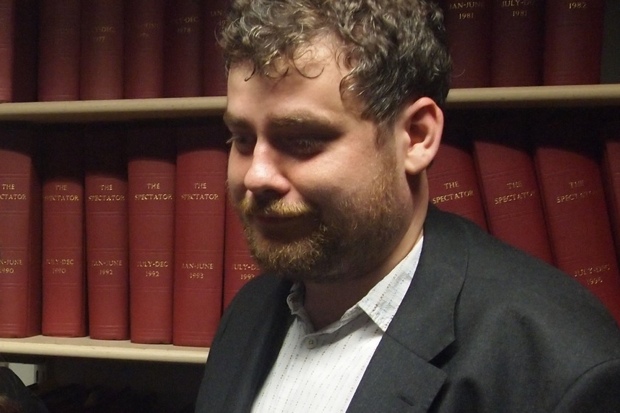Some of the best journalists in Britain rarely, if ever, have their names in print. One of them is my colleague Peter Robins, the genius chief sub editor (or, technically, production editor) of The Spectator. In his Times column today (£), Matthew Parris has a story about Peter. Here it is:
‘If you sometimes feel you’re getting gobbledegook from this columnist you should realise how much worse gobbledegook you’d get were it not for that most self-effacing of species, the sub-editor. I blush to remember the errors from which this page’s subs have rescued me.
But I believe The Spectator’s Peter Robins touched new heights last week when, after I submitted a column quoting the Latin phrase from which we derive “Don’t speak ill of the dead”, he sent me this email:
“Hello, I’m a tiny bit worried about your Latin . . . You seem to be reading ‘dicendum est’ as third-person present indicative passive, ‘is said’ — but that would be ‘dictum est’, I think. Dicendum’s the gerundive, making this something called a future passive periphrastic conjugation: ‘is to be said’, which in Latin has the force of advice from the speaker.”
He was right. In 50 years’ time, will such paragons even exist?’
I had no idea that Peter had sent this email, but it’s a tiny example of what a great sub editor does all the time. Matthew’s rather sombre endnote is one you hear a lot – are subeditors doomed, as newspapers contract and collapse? My own theory is that brilliant subeditors, like Peter Robins, will be needed more than ever. Here’s why.
In theory, the digital age means that star columnists like Matthew Parris could write on a blog, charge £10 a year and try to make more cash than they do from a newspaper. The digital world has given columnists the ability to sell their wares directly to the public. But this hasn’t happened – columnists have remained within the family of a newspaper or magazine. Why? Because few columns are really the work of just one person. It’s the result of the relationship between the writer, the commissioning editors and the sub editors. No columnist, no matter how renowned, has tried to break free of this arrangement. As a columnist, I can tell you why: we rely too much on other journalists, the people whose names you hardly, if ever, see.
 But the role of the sub editor goes far beyond saving the writer from himself. If you pick up any issue of The Spectator, you’ll see the magic of our world-class team sprinkled all over it. Peter stays until the wee small hours, way after everyone else has gone home, sweating the small stuff, working on the contents pages, finding pictures to draw the readers’ attention and the captions which transform the picture into a joke. It is these small touches, his love of language and attention to detail that make The Spectator the kind of magazine you want to have around your living room.
But the role of the sub editor goes far beyond saving the writer from himself. If you pick up any issue of The Spectator, you’ll see the magic of our world-class team sprinkled all over it. Peter stays until the wee small hours, way after everyone else has gone home, sweating the small stuff, working on the contents pages, finding pictures to draw the readers’ attention and the captions which transform the picture into a joke. It is these small touches, his love of language and attention to detail that make The Spectator the kind of magazine you want to have around your living room.
The skills of a good sub editor now stretch beyond fixing copy. The digital era means subs now write internet-only headlines, Kindle-only headlines, tags, master the dark arts of search engine optimisation and far more. The evolution of the media means new formats, so there has never been a greater need for versitile subeditors who adapt to these new formats. And design, too. The Spectator’s ‘NO’ cover (above), giving our answer to the Royal Charter on press regulation, was designed in about ten seconds by Pete.
I’ve worked for newspapers that have unwisely cut back on sub-editing. It seems to work, at first, because there is no immediate cliff-edge drop in quality. But the rot accumulates. Errors creep in that would have been unthinkable a few years earlier. Sloppy writing goes unchecked, flabby ideas go unchallenged. And even then, the newspapers don’t suffer immediate penalty – readers who have been with the same title for years put up with a lot, before giving up on it. But when they do, the reputation for quality is hard to win back. The management respond to falling revenues with even more cuts, which send even more readers into despair. This is what I call the cycle of doom.
So, the self-effacing species that Matthew talks about are not a luxury. Having good sub editors – nay, great sub editors – is essential for any publication that takes good writing seriously. And not for nostalgic reasons, but for reasons of hard-headed capitalism: money follows quality. That’s certainly our belief at The Spectator, which is why we’re comfortably in the black and read by more people than ever.
I’m not saying that there will be as many sub editors around in 50 years time. But I am saying that the newspapers and magazines who will be around in 50 years time will have bloody good sub editors. And they’ll know that they couldn’t survive without them.
NB: This piece was published without going through a sub editor. I rest my case.







Comments